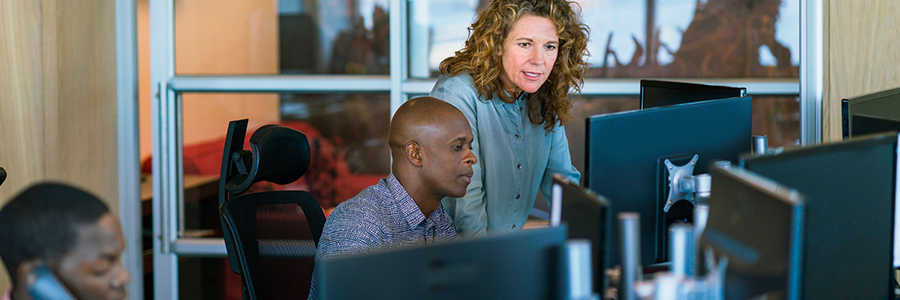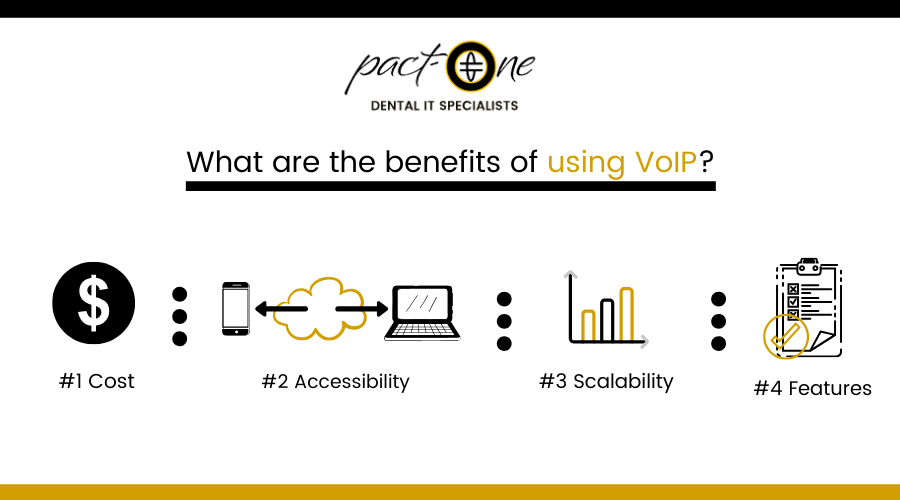Voice over Internet Protocol (VoIP) technology has taken the dental industry by storm, changing the way many dental clinics run their daily operations. But despite having a host of features that you will not find in traditional landline phones, there are also some disadvantages to having a VoIP system. If you're thinking of installing a VoIP system in your dental office, here are some pros and cons you need to know about.
What are the benefits of using VoIP?
#1 Cost
When it comes to saving on expenses, a VoIP system has the advantage over a traditional landline network. On average, the cost of a plain old telephone service (POTS) is around $30 to $50 a month per line. VoIP phones, on the other hand, cost an average of around $25 to $40 a month per user.
What’s more, a call between VoIP systems is free. Calling a landline using VoIP usually has a cost, but it's still significantly cheaper compared to a landline-to-landline call.
If your company wants additional telephone features such as call queuing and call forwarding, you would need to install a private branch exchange (PBX), which lets you have a private telephone network. A PBX can cost your dental clinic around $800 to $1,000 per user. On the other hand, these basic call features are already included in most basic VoIP packages. You also don’t need the additional hardware; just a good broadband connection and your existing computers and headsets will do.
#2 Accessibility
Perhaps the biggest advantage of VoIP over landline is you can make calls to and from just about anywhere. A VoIP system provides you with a virtual number that you can use no matter where you are, as long as you’re connected to the internet. This is perfect if you or your staff are frequently out of the clinic. Even if you move your dental practice to a new address, you can still use the same virtual number.
#3 Scalability
A VoIP system is a lot more scalable than landline networks, which is why a lot of businesses prefer it over the latter. With a traditional landline service, the number of phones you can add largely depends on how many lines are available for your current subscription. However, adding more lines would mean additional hardware and expenses. With a VoIP system, you need not purchase additional hardware to add new phones. As long as you have enough bandwidth, you can as many phones as you want.
#4 Features
VoIP comes with a host of features you will not normally find in traditional landline phones. Call forwarding, caller ID, call waiting, and more are just some amazing features that come free with VoIP. With a landline system, you usually have to pay extra for these features. In addition, VoIP allows you to hold video conferences with your staff, clients, and customers no matter where they are.
What are the challenges of using VoIP?
#1 Internet connection
What makes a VoIP system stand out from landlines is also its biggest weakness. To get the most out of your VoIP network, your dental clinic should have a reliable internet connection. If your clinic's current bandwidth is low, your VoIP service will surely suffer. Not only will you experience latency issues, but voice and call quality will also suffer.
One way of solving this issue is to get an extra internet connection dedicated solely to your VoIP system. That way, it will not compete for bandwidth with your clinic’s other internet-based apps. Another way of addressing internet outages or low bandwidth is to roll over the call to your cell phone using apps from your VoIP provider.
#2 Location tracking
Since VoIP uses the internet to make calls, it's hard to determine where a specific call is coming from. With no cell tower data or global positioning system (GPS) information to track, emergency services such as 911 can have difficulties pinpointing the exact location of an emergency call coming from a VoIP phone. Fortunately, geographical information can be integrated into VoIP phones during the setup process.
#3 Power outage
Another problem VoIP systems face is a power outage. When the power goes out, the internet goes out as well. With no power, VoIP systems are pretty much useless. Using uninterruptible power supplies or a generator is a good way to ensure your VoIP system remains operational even under a power outage. In addition, you can transfer the call to your smartphone using mobile VoIP apps mentioned above.
Despite the apparent disadvantages of VoIP, the benefits that it can provide are the reason more and more dental clinics are letting go of their traditional landline systems.
If you're thinking about setting up a VoIP system for your dental practice, you're going to need the help of a trusted managed IT services provider (MSP) like Pact-One. To learn more about how your dental clinic can benefit from VoIP phones, connect with us today!



